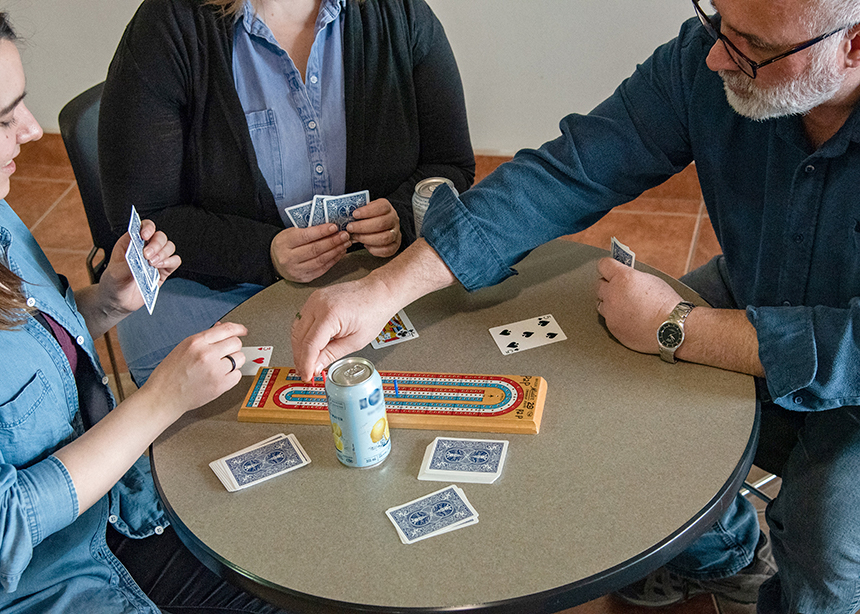COVID-19 has altered the lives of most Canadians, but for those in prison and those reintegrating into society after prison terms, the pandemic’s impact is enormous.
Parkland Restorative Justice in Prince Albert, Sask., offers inmate visitation through its Person to Person (P2P) program. Executive director Heather Driedger says visitors have not been allowed into the federal penitentiary since mid-March. Phone calls are also not permitted.
She encourages Parkland’s volunteers to write letters to the inmates they had been visiting and to try to maintain contact with them.
Micah, a Saskatoon-based restorative justice organization, also supports inmates in the Regional Psychiatric Centre through P2P.
The Centre has relaxed its rules, says Dave Feick, Micah’s executive director and community chaplain. Prior to COVID-19, volunteer visits and phone calls could only take place during regularly scheduled P2P time. But, “with this [pandemic] they’ve opened that up. [Volunteers] are able to phone and write letters.”
Phone calls and letters are critical, especially for inmates who have no other source of support.
“It’s challenging for their mental health to find motivation or hope for the day,” says Heather. “They’re in survival mode, trying to wait it out.” Many would like to move forward with their correctional plan, she says, but the programs they need to take are no longer happening.
Feick says that many clients wonder what things are like on the outside. “They’re wondering what will be there for them when they do get released,” he says.
Concerned citizens have called for the early release of nonviolent offenders in order to lower population density in correctional facilities and, thus, the potential spread of COVID-19. While this might solve one problem, it would create others.
“Where are those people supposed to go?” asks Feick. “If they have good supports and a place to live, that’s one thing, but if they’re just being turned loose and don’t know where they’re going, that [puts them at] greater danger of reoffending.”
Inmates aren’t the only vulnerable ones. Former sex offenders served by Circles of Support and Accountability (CoSA) are also in precarious positions.
Florence Driedger volunteers with CoSA South Saskatchewan in Regina, where upwards of 22 circles of three to five volunteers used to meet regularly with released sex offenders, known as core members. These circles offer support and friendship, but also hold core members accountable so they don’t reoffend.
Now that they can’t meet in person, many circles meet online. But not all core members have internet access. Some can’t afford the technology while others are not permitted internet access as a condition of their release. For them, meeting by phone is a solution, albeit an imperfect one.
“It works as best as it can work,” says Florence. “But you can’t see. So much of communication is nonverbal.”
Most CoSA circles met weekly before the pandemic started, but now it’s important to meet by phone more frequently.
“Core members often feel unwanted and unloved,” says Florence. “This COVID-19 thing really turns it right back to being unwanted and unloved, like when they were in prison.”
While the three organizations are doing their best to support both clients and volunteers, their employees’ jobs are less secure than they were just weeks ago.
“Our funders are not sure they can send our regular cheque,” says Feick. “Even when we apply to a foundation for a program we’re already running, they say they’re setting aside all applications they’ve already received and we’re having to reapply.” This means trying to access other sources of funding they haven’t accessed before.
Heather also worries about funding. Some of Parkland’s donors are out of work and not able to give as they had been. And, if the situation continues, Parkland may lose volunteers, as people find themselves in different circumstances.
Although the situation seems bleak right now, Florence is philosophical. “We’ve had to change ways of doing things so many times, so often, in so many different ways,” she says. “This is just one more of those ways.”
And there are signs of hope and of God’s presence. Heather finds hope in her engagement with Parkland’s volunteers, who have proven enthusiastic about writing letters. “They’re not giving up on these relationships,” she says.
For Feick, hope comes from knowing that others are doing what they can to help. “Even getting a call from a reporter from Canadian Mennonite [helps me] realize we’re not alone,” he says.
These organizations’ administrators trust God will see them through this crisis.
“If it is to continue it will continue because of God at work,” says Heather.
Do you have a story idea about Mennonites in Saskatchewan? Send it to Donna Schulz at sk@canadianmennonite.org.
Related stories:
Caring during COVID-19 crisis
Westview adapts outreach during pandemic
Bread, masks and serving seniors








Leave a Reply
You must be logged in to post a comment.